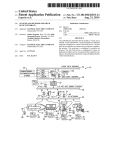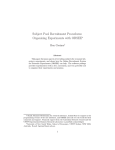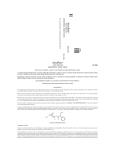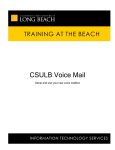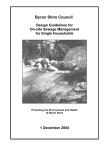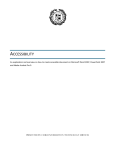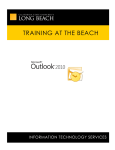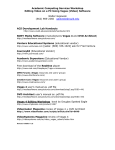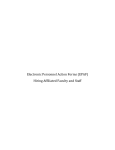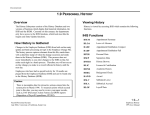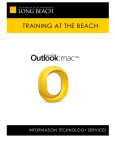Download experimenter guidelines - California State University, Long Beach
Transcript
EXPERIMENTER GUIDELINES INFORMATION PACKET FOR RESEARCHERS DEPARTMENT OF MARKETING Prepared by: PAMELA MILES HOMER, Ph.D. Professor of Marketing & Research Coordinator [email protected] ATTENTION ALL FACULTY AND GRADUATE STUDENTS USING HUMAN SUBJECTS FOR RESEARCH OR THESIS PROJECTS YOU MUST OBTAIN & SUBMIT A Human Subjects Protocol Application Form For information and applications, go to: http://www.csulb.edu/divisions/aa/research/our/compliance/irb/ A copy of the IRB Approval letter must accompany all applications requesting use of the Marketing Human Subjects Pool. INFORMATION FOR RESEARCHERS CONCERNING THE UTILIZATION OF HUMANS IN RESEARCH Behavioral research involving human participants has come under increasing scrutiny by the government, and serious questions of ethics and invasion of privacy have been raised. It is imperative, therefore, that you take your job as a researcher seriously, behaving with dignity, discretion, and a sense of responsibility toward your research, and above all, the welfare of your participants. Your conduct will reflect on the entire department, and the field as a whole. I. ETHICAL STANDARDS FOR SOCIAL SCIENCE RESEARCHERS A. HARMFUL AFTER-EFFECTS: Only when a research study has significant potential of benefiting mankind, can the researcher be justified in giving misinformation or exposing research participants to physical or emotional stress. It is Federal Policy (and policy of the department and CSULB) that any student whose research (1) uses deception (The purposeful giving of misinformation that may reasonably affect the participant's willingness to participate.); (2) requires the experimenter to physically touch the participant; or (3) or presents any danger of EMOTIONAL or PHYSICAL STRESS or HARM, the researcher MUST state this in their IRB application protocol and have it approved; this is in addition to the procedure indicated in this packet. Participants have been made aware of the fact that complaints may be brought to the Subject Pool Coordinator and Marketing Department Chairperson. All complaints MUST also be brought to the CSULB Institutional Review Board for the Protection of Human Subjects via the Office of University Research. Researchers contemplating the use of deception or concealment are required to THOROUGHLY DEBRIEF participants at the end of their research session. In no instance should a participant leave the research setting feeling stressed, anxious, or embarrassed as a result of a deception manipulation. Should any participant object to having their data used upon debriefing, this must be honored. In other words, when deception is used, the participant has a right to opt out of the study after he/she is made aware of the missing information or deception at the end of their research session. A copy of the “Debriefing Script” that will be provided to participants must be included with the Human Subjects Protocol Application Form submitted for IRB review. B. MORAL AND LEGAL STANDARDS: The marketer, in the practice of his/her profession, shows sensible regard for the social codes and moral expectation of the community in which they work. C. CONFIDENTIALITY: No matter what a study is about, the researcher should try to maintain participant’s confidentiality. Participants must be assured that no one other than the researcher will know how they performed. A researcher must convey the idea that he/she wants to make a general conclusion about a population of people, not the individual participants. All identifying information should be removed from the data records as soon as possible (e.g., Absolutely no names should be written on data forms and answer sheets. Assign code numbers instead of names.) In an instance where the individual's identity must be retained for a short period of time (e.g., pre-post designs,) the researcher incurs an additional responsibility to keep the data files in a safe and secure place. When identifying data must be kept for an extended period of time, the researcher must inform the participants of this fact and the reasons for the need. Any participant who objects must be respected and excused from participation. D. PARTICIPANT WELFARE: The researcher respects the integrity and protects the welfare of the person or group with whom he/she is working. Participants should be made aware that they can leave at any time during the study. If the participant does choose to leave, he/she is to be given the same number of credits as participants who complete the study, and is to be completely debriefed. If a participant appears to be stressed or uncomfortable during the study session, but does not explicitly request to terminate, the researcher should inquire about their state and again assure the participant that he/she does not have to continue. Nonexplicit signs to consider include: worried or anxious facial expressions, excessive hand or foot "dancing," hand wringing, rubbing of face or forehead, off-task behavior, repeated requests as to when the session will be over, teary eyes, or expressions of a desire to be doing something else or somewhere else. If a researcher believes that a participant was upset and the researcher was unable to sufficiently handle the situation, the incident should be reported immediately to the Research Coordinator (who will contact the researcher's supervisor in the case of undergraduate or graduate theses), and if necessary, the Department Chairperson. Additional ameliorative efforts should be considered and executed if possible. Examples may include (1) the calling of a special session with the participant and researcher (or participant, student researcher, and research supervisor) for the purpose of discussing the situation, (2) inviting the participant to review the study purpose and design in an informal supportive context. In the very unlikely event of an extreme reaction during a study session, the researcher/student researcher should immediately call in the Research Coordinator who will contact the Counseling Center. E. COMPETENCE: The maintenance of a high standard of professional competence is a responsibility shared by all academic researchers, in the interest of the public and of the profession as a whole. Student researchers need to remember that just because he/she is a student does not mean he/she is NOT doing real research! Those who participate in a student-authored (or faculty-authored) study at CSULB possess the exact same rights as those who participate in a study by a researcher at Stanford performing his or her hundredth study. II. WHAT IS THE HUMAN SUBJECT POOL? The Department of Marketing requires all MKTG300 students to either (1) participate in experiments or (2) write a paper on a selected topic related to Marketing Research to be assigned by the Subject Pool Coordinator (topics vary each term, e.g., “Nonresponse Error”, “Sources of Error in Social Science Research”) during the Fall and Spring semesters. [Note: This course requirement represents a maximum of 5% of the final course grade.] The subject pool exists both for the purpose of making human subjects available to individuals associated with the department as well as to give introductory marketing/business students the opportunity to observe the research process first hand. The experience of participating should be an educational one that introduces the marketing/business student to one of the major research tools and also provides a source of subjects for the research projects and theses of faculty and students. A. WHO CAN USE THIS SOURCE OF SUBJECTS? The following are eligible to use the Human Subject Pool: (a) all full-time and part-time Marketing faculty members (including tenure-track and temporary appointees); (b) all currently enrolled CBA graduate students who have a thesis requirement for graduation; (c) students enrolled in the CBA Honors Program, (d) other non-CBA CSULB tenuretrack faculty (depending on demand from CBA faculty). For student research projects, the faculty supervisor is responsible for the student researcher actually abiding by this guide. Anyone else seeking access to the subject pool (including individuals from outside the Department of Marketing) must receive specific approval from the Human Subjects Faculty Administrator or Department Chair. Where the purposes of a study are primarily pedagogical, such as would be the case with undergraduate research methods courses, sources of subjects other than the MKTG300 pool should be obtained. This restriction is imposed partly to insure ample supplies of subjects for bona fide research, as opposed to class projects where the main purposes are to learn skills and techniques of experimental research. B. WHAT ARE THE PROCEDURES THROUGH WHICH ONE MUST GO TO OBTAIN SUBJECTS? 1. All prospective users of the Subject Pool must first complete the online “Responsible Conduct of Research Orientation Module on Protection of Human Subjects”. This exam must be passed before the IRB Protocol Application is submitted. 2. Submit a proposal to the Institutional Review Board for the Protection of Human Subjects (IRB) for review to insure that the project meets ethical standards for human subjects research. If the IRB ultimately approves the project, an application to use the Subject Pool can then be submitted. A copy of the IRB approval memo must accompany this application. [Note: All applications are submitted via IRBNet.org.] 3. III. The faculty member or supervised student must obtain and complete an application to use the Subject Pool. The application packet is available from the Department of Marketing office and can be downloaded from the department web site: www.csulb.edu/depts/marketing. Experimenters who return the subject request form within the first two weeks of the term will be given priority. However, experimenters requesting more than 150 subject hours may be required to refrain from running their full allocation until later in the semester. Those who run 50% of their subject allocation by the end of the seventh week will be given priority for the remaining subjects. If necessary, a priority system to allocate subject requests made after the tenth week will be invoked. The priority system would follow the order of eligibility outlined in II.A above. GETTING STARTED A. READ THIS INFORMATION PACKET COMPLETELY BEFORE FILLING OUT ANY PAPERWORK. It would be a good idea for all researchers to carefully read the copy of the PARTICIPANT INFORMATION, as well. This will help clarify their important role in your research studies. A copy is included at the end of this document. B. Faculty and student researchers must obtain approval from the CSULB Institutional Review Board for the Protection of Human Subjects prior to using any human participants. Procedures are detailed at: http://www.csu1b.edu/divisions/aa /research/our/compliance/irb/. All applications are submitted via the IRBNet.org website. Phone (562) 985-5314 if you have additional questions. C. Researchers are advised to submit their applications at least one month before data collection begins to allow for revisions and additional reviews that may be requested. D. EACH RESEARCHER MUST COMPLETE THE FOLLOWING STEPS: 1. APPLICATION FORM (included at the end of this document) a. An Application Form is required for all researchers running projects in conjunction with the Department of Marketing that propose to use subjects from the department's subject pool. b. The application includes: Fill in all information requested. 1. Name of experimenter, phone number, and e-mail address 2. Name of supervising faculty member 3. Number of subjects requested (total and per/week) 4. Date(s) of experiment 5. Location of experiment 6. Length of experiment 7. Apparatus to be used 2. DEBRIEFING FORM. As the subject's participation is intended to be an educational experience, feedback about the purposes of the experiment is a requirement. Experimenters must provide feedback to all subjects participating in their experiment. It is suggested that such feedback include a description of the purpose and the hypotheses of the experiment, an explanation of the method employed, and a discussion of possible theoretical and/or practical implications of the expected results. The feedback should be able to be easily understood (by a MKTG300 student) and should be educational. [Note: The Debriefing Statement MUST be approved by the IRB: i.e., it must accompany the Protocol Application.] a. A Debriefing Form is required for all researchers using subjects from the department's subject pool. * Under certain circumstances you may not actually be able to debrief your subjects, (i.e., observational studies, certain field studies). * You are still required to complete a Debriefing Form. b. Following the session, the participants should be thanked and then be told the true nature and purpose for the research study in which they just participated. * You may read your debriefing information to them, or * You can give them copies to take with them. c. A debriefing sheet (approximately one full, typewritten page) should describe the study, its purpose, why certain procedures were used, the hypothesis, independent and dependent variables. It must also include information missing from the informed consent form, such as the true purpose or nature of the study, etc., or any deceptions employed. [Note: The Debriefing Statement MUST be approved by the IRB: i.e., it must accompany the Protocol Application.] d. If you are a student, your typed debrief sheet should be reviewed and initialed by your faculty supervisor. 3. RECRUITMENT NOTICE. The researcher must provide the IRB with a copy of the notice that will be used to recruit potential subjects (i.e., whatever information will be posted to notify potential subjects of the study and the nature of the study). 4. SIGN THE APPLICATION FORM (STUDENTS: HAVE YOUR SUPERVISOR SIGN THE FORM AS WELL) and submit it (with all required documents) to the Subject Pool Faculty Administrator (Coordinator) via email ([email protected]) or the Department of Marketing ASC in CBA 354. IV. RESEARCH APPROVAL A. When you have completed Steps 1-3, your Application Form and Debriefing Form will be reviewed by the Subject Pool Coordinator. B. All forms will be checked for their completeness. All forms filled out incorrectly must be resubmitted, PLEASE READ ALL INSTRUCTIONS CAREFULLY. C. You will be given a Study Number and a Password (a secret code to allow you to post your experiment on-line at the Sona Systems Website). If you decide to change your password, try to pick a password that is memorable but also guessresistant. If other research assistants will be accessing the Sona program to run your experiment, you will need to let them know the password. A password is needed to enter your experiment information, display your experiment to potential subjects, view the subjects' name for each experimental session, record credits/penalties, etc. D. You will also receive any assistance you may need regarding use of the Sona Systems Program at this time. 1. USING SONA (AFTER APPROVALS) a. In order to post your study, (so your subjects can sign up), you need to go to the Marketing Department's Official posting location, linked at: www.csulb.edu/depts/marketing. [Note: You will be transferred to a Sona Systems site: http://csulb-marketing.sona-systems.com. ] b. You will then be asked to provide your Logon and Password. These will be provided by the Research Coordinator. [Note: the password is case sensitive.] It is suggested that you change your password once you log in for the first time. Choose “My Profile” form the top toolbar to change a password or to update your personal information (e.g., preferred e-mail address, office, phone number). c. Select “Add New Study” to get started. This section lets you enter experiment information, add experimental sessions, set eligibility requirements, etc. All fields must be completed to “save” and post a study. Once you save the set-up information, you can add time slots. Students will then be able to sign-up. Once you have a study(s) posted on the system, you can use the “My Studies” link to view all your studies, make changes, post credits, etc. d. You may Delete a session ONLY if no participants have signed up. If you want to delete a session for which students have signed up, contact the Research Coordinator. Only he/she can delete such sessions. e. For help, select Support on the Sona-systems home page. Complete documentation for researchers and students is online at: http://www.sona-systems.com/support/docs/ems_docs.pdf . f. 2. EACH DAY, after you finish running your study sessions, you MUST return to Sona-systems.com to award CREDITS or PENALTIES for your subjects. For long-term online studies, credits must be awarded within 72 hours. Each session (up to one hour) receives one (1) point. REGARDING SIGN-UP TIMES a. Use the Sona program to arrange your times as indicated above, then follow the parameters listed below: 1. DO NOT SCHEDULE PARTICIPANTS EARLIER THAN 8 AM OR LATER THAN 8 PM. 2. When you fill in your time schedule for running your subjects, be sure to schedule additional time between each participant (in case one participant is late or runs over their allotted amount of time.) You must have at least 5 minutes to spare between subjects or groups of subjects. IV. RUNNING YOUR STUDY A. GENERAL INFORMATION 1. You should dress in a neat and professional manner when conducting your study. 2. You should arrive at your research location in time to have all your materials ready. You need to print a copy of your appointments for each day from the Sona Website, and bring it with you. If you forget to do this, use the computers in the CBA computer lab and handwrite the information to take to your study. 3. Be sure to post a DO NOT DISTURB sign on the door (one is included in your Information Packet for Researchers), see the Coordinator if you have forgotten your copy. BE SURE TO WRITE YOUR STUDY NUMBER ON THE SIGN (as well as any other identifying information that would make it easier for your subjects to locate you when the door is closed). 4. You will need to continually monitor changes that may occur to your study. These may include: Authorized Cancels (within the two hour time range). Participants must go to the Sona website to cancel. You should check your experiment on line to look for cancels and additions. You may use one in any university computer lab or go online wherever you have Internet access. 5. Carry out the informed consent procedures as you have outlined them in the 1RB protocol, i.e., tell the subject what is about to happen and that the subject is free to leave or to begin the experiment. If the subject wishes to continue, the experimenter may then begin the experiment, and at the same time inform the subject that s/he has the right to leave at any time. B. ASSIGNING CREDITS 1. 2. 3. Each participant is given ONE CREDIT for any session lasting up to 60 MINUTES. If the session lasts more than 60 minutes, they are to receive TWO CREDITS. They receive credits for the time they actually participate in your study, NOT the "extra time" you must schedule between subjects. For example: if you are running a participant every 60 minutes, but you have estimated that the study itself only takes 45 minutes, then the participant will only get 1 credit. However, if an individual happens to go over the 60 minutes, they would personally receive 1 additional credit for staying longer than anticipated. REMEMBER: After data collection is completed, you MUST debrief your participants unless you have been approved for delaying until the end of the term. IMPORTANT: At the end of each day, you MUST return to the Sona Website to award credits to the participants who did and did not show up. Researchers should not award penalties: the Department of Marketing does not penalize “no shows”. You can change the number of credits each subject earned if you need to award additional credit at this time (requires Administrator approval). (If this is not done, the final report sent to each professor at the end of the semester will be incorrect.) C. PARTICIPANT FAILURE TO APPEAR 1. Participants can cancel their appointments up to 2 hours prior to the start time through the Sona Website. However, a new participant can sign up at the last minute, even all the way up to your project's start time. Be sure to ask your subject their name, and if it does not match your original print-out, ask if they signed up at the last minute on the Sona site. 2. Wait at least 5 minutes for your volunteer to arrive and if the participant fails to appear, you should record this participant as a "no show" – or you can “cancel” the signup. (This person will not be receiving ANY penalties OR credits.) C. RESEARCHER FAILURE TO APPEAR 1. A researcher's failure to report at the proper time and place is a serious offense that should be avoided at all costs. 2. If a researcher is unable to attend (due to illness or emergency), he/she should contact the Coordinator as soon as possible via email. You must then give FULL CREDIT to all participants who were signed up for your study in your absence BY ADDING THE SUBJECT AND INSTRUCTOR NAME TO THE PARTICIPATION RECORD FOR ALL STUDENTS WHO HAD SIGNED UP FOR THAT SESSION SO THAT THEY RECEIVE CREDIT AS WELL AS BY REPORTING CREDIT FOR ALL SUCH PARTICIPANTS ON SONA. 3. In the event that a session is cancelled, a standard "Experimental Session Cancelled" form must be posted on the door of the experiment room. The ESC form may be posted by the Experimenter him/herself, or the Experimenter may arrange to have a colleague or the department office post the form. 4. If for any reason, a researcher should decide to leave his/her study early, remember: participants can sign up at the last minute and still receive full credit, even if you are not there. You must cancel any open available slots before leaving, by returning to the Sona Website and deleting any open times. You cannot leave early if you still have subjects coming to your study, UNLESS you have a health or personal emergency. NO STUDIES CAN BE POSTED TWO WEEKS BEFORE FINALS BEGIN! PLAN AHEAD. THE FINAL DEADLINE FOR RUNNING PARTICIPANTS I S ( WILL ALWAYS BE) THE FRIDAY OF THE SECOND TO LAST WEEK OF CLASSES. The Human Subject Pool Faculty Administrator (Coordinator) retains control over the Subject Pool. Failure on the part of subject pool users to adhere to subject pool policy may result in restriction of access to the subject pool for a period of time to be determined by the Human Subject Pool Faculty Administrator. (Note: More severe penalties will apply to repeat offenders.) Decisions of the Human Subject Pool Faculty Administrator may be appealed to the Department Chair/Advisory Committee. Address all questions and/or problems to the Subject Pool Faculty Administrator. RESEARCHER INFORMATION BRIEF SUBJECT POOL COORDINATOR: CBA 354; [email protected] PRIOR TO APPROVAL 1. The complete information packet for researchers (this document) is available on the Marketing Department website. 2. READ ALL INFORMATION BEFORE YOU FILL OUT ANY FORMS. 3. Application Form –Fill out form (see next page). For student studies, it must be signed by the supervisory instructor prior to approval by the Coordinator. 4. Debriefing Form – Follow example on the IRB web site. For student studies, it must be signed by the supervisory instructor prior to approval by the Coordinator. Instructor approves by initialing box on Application Form. Retain Application Form and Debriefing Form until you have completed Step 6. 5. Leave the Application Form, Debriefing Form and IRB approval letter for the Subject Pool Coordinator in CBA 354. You will eventually receive your study #, password, equipment assistance, and additional info. AFTER APPROVAL 1. 2. Go to http://www.sona-systems.com a) Log in. Your username and password will be given to you by the Research Coordinator. b) Click on “My Profile” from the top toolbar and change your phone number. Also, provide your preferred e-mail address, phone number, and office number in this section. c) Click on "Add new Study" and follow instructions given above. The Sona Systems User Manual that can be downloaded from the Marketing Department web site. Wait for participants to sign up. On the day of your study print out a copy of your experiment appointments and bring it to your study location. a) Participants can cancel up to 2 hours prior to their study time (via the Sona site). b) To update your appointments, use any computer with Internet access. RUNNING YOUR STUDY 1. Arrive at your study location well before your first participant to check out and set up your equipment. 2. When participants arrive, make sure they are signed up for your study. Confirm their full names on your list. 3. Have participants sign the Consent Form. 4. Remember to debrief your subjects before they leave. 5. When you are finished running participants for each day, go back to the Sona web site. You must award credits for “shows” and cancel or assign “no shows”. Participants will not receive credit allocation at the end of the semester if you do NOT do this final task. Department of Marketing SUBJECT POOL REQUEST Name of Experimenter _________________________ Phone _________________ Semester/Year________________________________ Course No. _______________ Experiment Dates: Beginning ____________________ Ending _________ Number of Subjects Requested __________________ Length of Experimental Sessions ______ [per subject] Location of Experiment: Building Room _____________________ Apparatus to Be Used: ______________________________________________________________________ ______________________________________________________________________ ______________________________________________________________________ (Electrical or mechanical apparatus which subjects will come into physical contact with during an experiment must be inspected and approved for safety by the IT Department Technician.) Safety Approval signature date I signify that the above information ids correct and complete to the best of my knowledge and that I have received, read, and will abide by the Marketing Department Human Subject Pool Policy Statement. Experimenter signature date signature date Faculty Advisor [Note: Advisor signature necessary only if the experimenter is a student.] Required Attachments: 1. 2. 3. 4. Copy of IRB Approval for this project. Verbatim instructions to be given to subjects. Verbatim feedback to be given to subjects. Standardized debriefing form. Study/Project Title Thank you for participating in this study. Your time and efforts are much appreciated and will be useful in advancing the field of marketing. Below is a description of the study's purpose, methods, expected results and practical implications of the study. In part, this information is provided to help you understand social science research and complement what you are learning in MKTG 300. Purpose of experiment: Hypotheses Tested: Description of the Research Methodology/Procedures: Expected Results:















